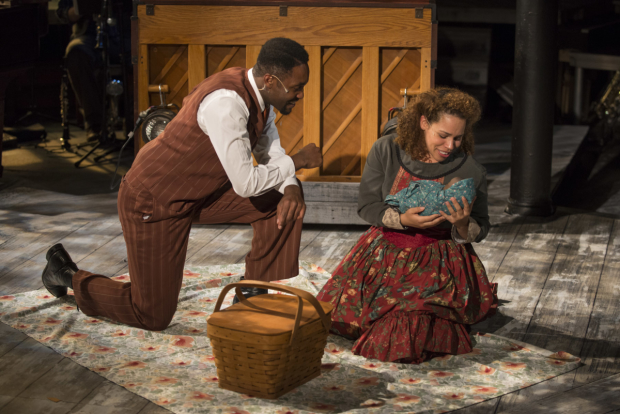Ragtime

(© Michael Brosilow)
Of all the musicals that have received a stripped-down, minimalist makeover in recent years, Ragtime seems like an unlikely candidate for a successful production. Lynn Ahrens and Stephen Flaherty's lavish 1998 musical tells the story of America's teeming masses, weaving fictional characters and narratives together with real-life figures, calling for a huge cast and a vast stage. But Griffin Theatre Company has created a fresh and inventive Ragtime for 2017, one that speaks to a world that now seems smaller than it ever has.
Set at the end of America's gilded age, the musical follows the paths of three American families: a Harlem nightclub pianist named Coalhouse Walker Jr. (Denzel Tsopnang) and his lover Sarah (Katherine Thomas), Tateh (Jason Richards) a Latvian artist who has come to America with his young daughter (Autumn Hlava), and a well-heeled New Rochelle family (Scott Allen Luke as Father, Laura McClain as Mother, Matt Edmonds as Younger Brother, Larry Baldacci as Grandfather and Ben Miller as the Little Boy). Their paths first cross at a great distance, as Tateh and Father glimpse each other in passing ships, but as the 20th century continues and America begins to reinvent itself, their paths cross closer and converge.
Directed by Scott Weinstein and choreographed by William Carlos Angulo, this Ragtime places the audience on all sides of the action in the Den Theater's small downstairs theater. Any worries about space are put to rest in the musical's opening number — the limited playing area is an asset, not a liability. The characters must fight each other for every inch of stage that they occupy. The denizens of New Rochelle are chased offstage by the Harlem folks, who are then crowded out by the Eastern European immigrants. Later in the musical, as the characters' lives all intertwine, the cast stays present, bearing witness to the indignities suffered by their fellow Americans.
The tight staging also allows for an intimacy not usually seen in a megamusical. McClain sings through Mother's budding ethical development with nuance and wit. Tateh's fierce love for his daughter is clear on Richards' face. Thomas's voice is as beautiful and warm as her smile, and the love between Sarah and Coalhouse is palpable. Much of the second act of Ragtime falls on Coalhouse's shoulders, and Tsopnang does the role justice, giving Coalhouse such vitality and certainty in the first act that his later pain is even more tragic. In the supporting cast, Neala Barron is electric as Emma Goldman, and Danielle Davis' powerful, emotive voice brings down the house in Act 1's "Till We Reach That Day."
The voices are supported by new orchestrations for Matt Deitchman, who has stripped down Stephen Flaherty's lush score for two pianos (Jermaine Hill and Ellen Morris) and one clarinet (Dan Hickey), which produces an intimate club atmosphere that suits the material.
Despite the reduced cast and orchestra, this production is hardly minimal. Costume designer Rachel Spyniewski has created a seemingly endless parade of turn-of-the-century costumes, and Alexander Ridgers' lighting design is bold and vibrant. The music direction (by Hill and Morris) is lovely, but unfortunately, this production is facing several sound design issues. Despite the best efforts of co-sound designers Stephen Ptacek and Ralph Loza, voices and diction occasionally get lost in William Boles's open set.
Ragtime has perhaps never been more timely than it is now. By scaling back the spectacle and blurring the lines between audience and performance, Griffin Theatre Company has also made it more relatable than ever before.











